Walbank F.W., Astin A.E., Frederiksen M.W., Ogilvie R.M. The Cambridge Ancient History, Volume 7, Part 1: The Hellenistic World
Подождите немного. Документ загружается.

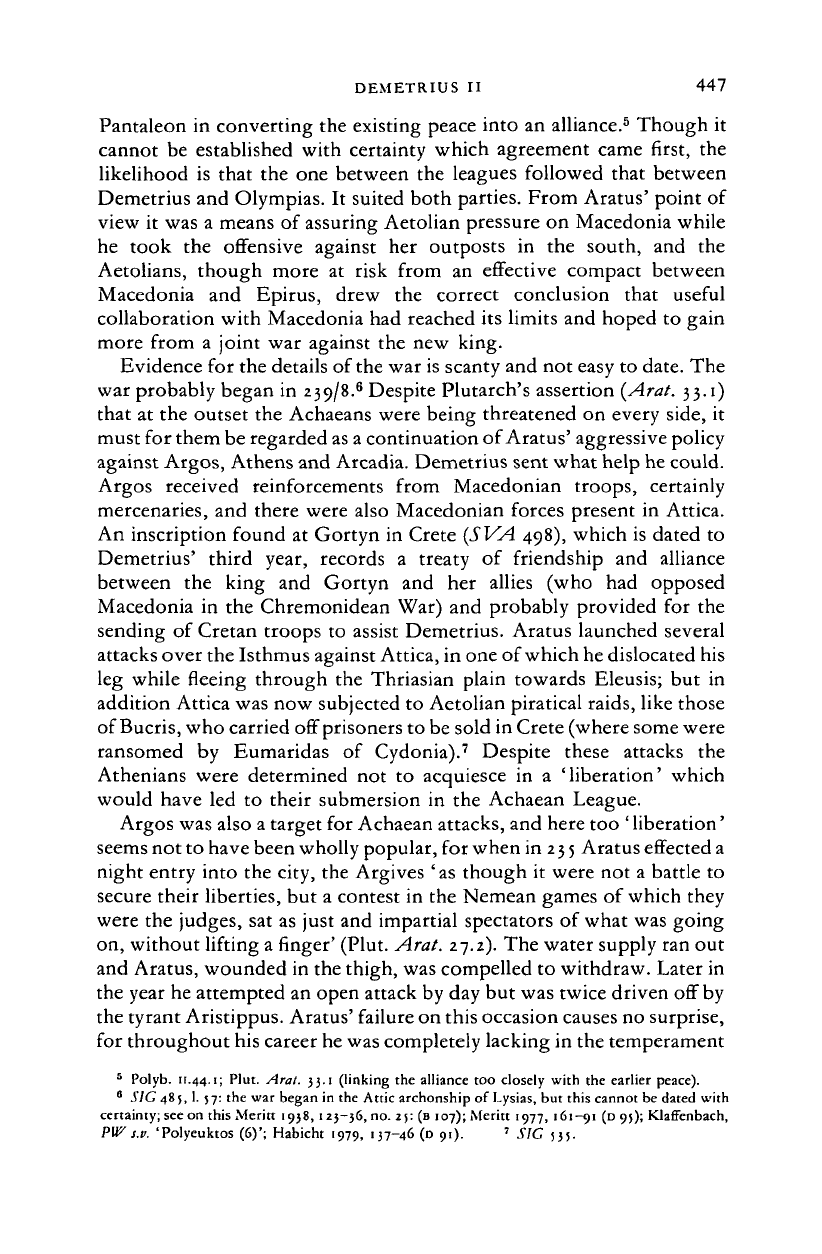
DEMETRIUS II 447
Pantaleon in converting the existing peace into an alliance.
5
Though it
cannot be established with certainty which agreement came first, the
likelihood is that the one between the leagues followed that between
Demetrius and Olympias. It suited both parties. From Aratus' point of
view it was a means of assuring Aetolian pressure on Macedonia while
he took the offensive against her outposts in the south, and the
Aetolians, though more at risk from an effective compact between
Macedonia and Epirus, drew the correct conclusion that useful
collaboration with Macedonia had reached its limits and hoped to gain
more from a joint war against the new king.
Evidence for the details of the war is scanty and not easy to date. The
war probably began in 239/8.
6
Despite Plutarch's assertion {Aral. 33.1)
that at the outset the Achaeans were being threatened on every side, it
must for them be regarded as
a
continuation of Aratus' aggressive policy
against Argos, Athens and Arcadia. Demetrius sent what help he could.
Argos received reinforcements from Macedonian troops, certainly
mercenaries, and there were also Macedonian forces present in Attica.
An inscription found at Gortyn in Crete [SVA 498), which is dated to
Demetrius' third year, records a treaty of friendship and alliance
between the king and Gortyn and her allies (who had opposed
Macedonia in the Chremonidean War) and probably provided for the
sending of Cretan troops to assist Demetrius. Aratus launched several
attacks over the Isthmus against Attica, in one of which he dislocated his
leg while fleeing through the Thriasian plain towards Eleusis; but in
addition Attica was now subjected to Aetolian piratical raids, like those
of Bucris, who carried off prisoners to be sold in Crete (where some were
ransomed by Eumaridas of Cydonia).
7
Despite these attacks the
Athenians were determined not to acquiesce in a 'liberation' which
would have led to their submersion in the Achaean League.
Argos was also a target for Achaean attacks, and here too 'liberation'
seems not to have been wholly popular, for when in
23 5
Aratus effected
a
night entry into the city, the Argives 'as though it were not a battle to
secure their liberties, but a contest in the Nemean games of which they
were the judges, sat as just and impartial spectators of what was going
on, without lifting a finger' (Plut. Aral. 27.2). The water supply ran out
and Aratus, wounded in the thigh, was compelled to withdraw. Later in
the year he attempted an open attack by day but was twice driven off by
the tyrant Aristippus. Aratus' failure on this occasion causes no surprise,
for throughout his career he was completely lacking in the temperament
5
Polyb.
11.44.1;
Plut. Aral. 33.1 (linking the alliance too closely with the earlier peace).
6
SIC
48
j,
1.
57: the war began in the Attic archonship of Lysias, but this cannot be dated with
certainty; see on this Meritt 1938, 123-36, no. 25:
(B
107); Meritt 1977, 161-91
(D
95); Klaffenbach,
PW
s.v.
'Polyeuktos (6)'; Habicht 1979, 137-46
(D
91). ' SIC 535-
Cambridge Histories Online © Cambridge University Press, 2008
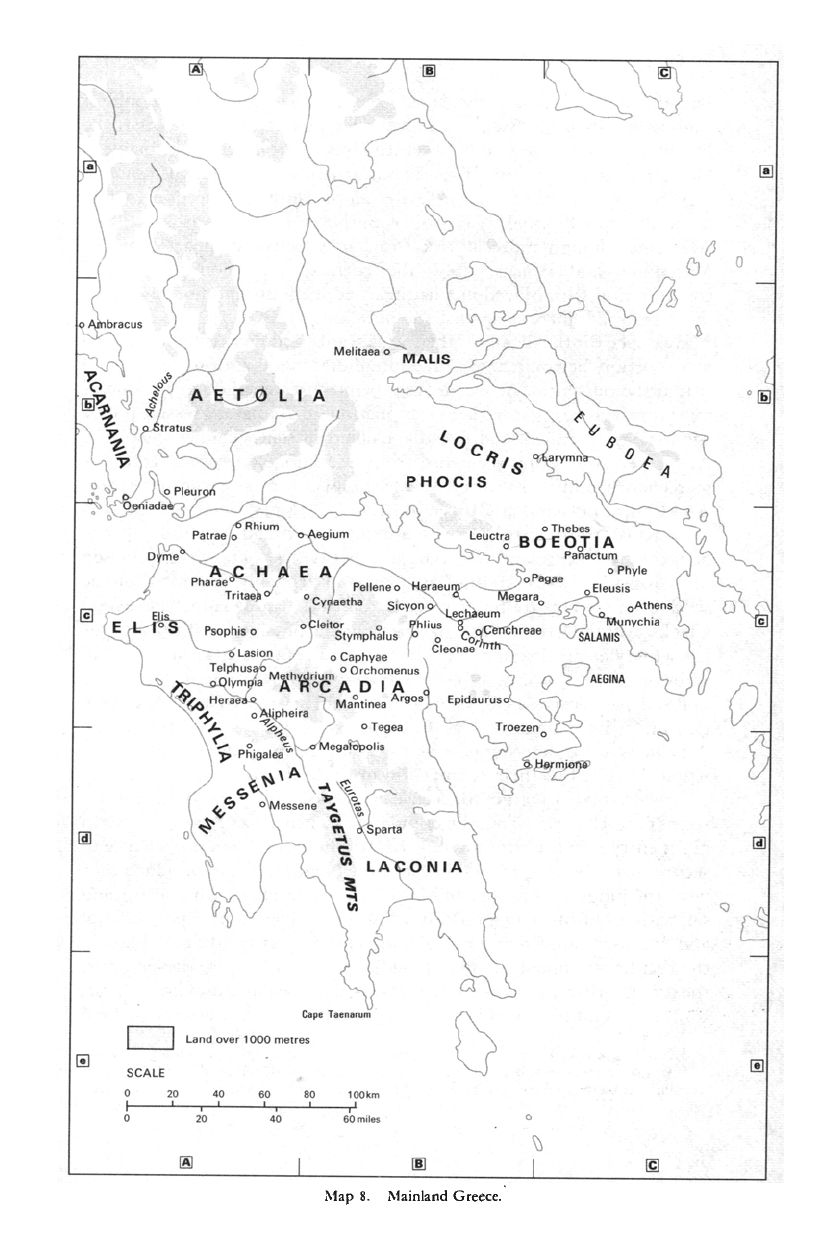
m
a
®
o Thebes
BOEOJIA
Panactum
o Phyle
oragae
Eleusis
m
r^
0
ED
Cape Taenarum
Land over
1000
metres
SCALE
s
20 40 60 80 100km
m
®
Map 8. Mainland Greece.
Cambridge Histories Online © Cambridge University Press, 2008
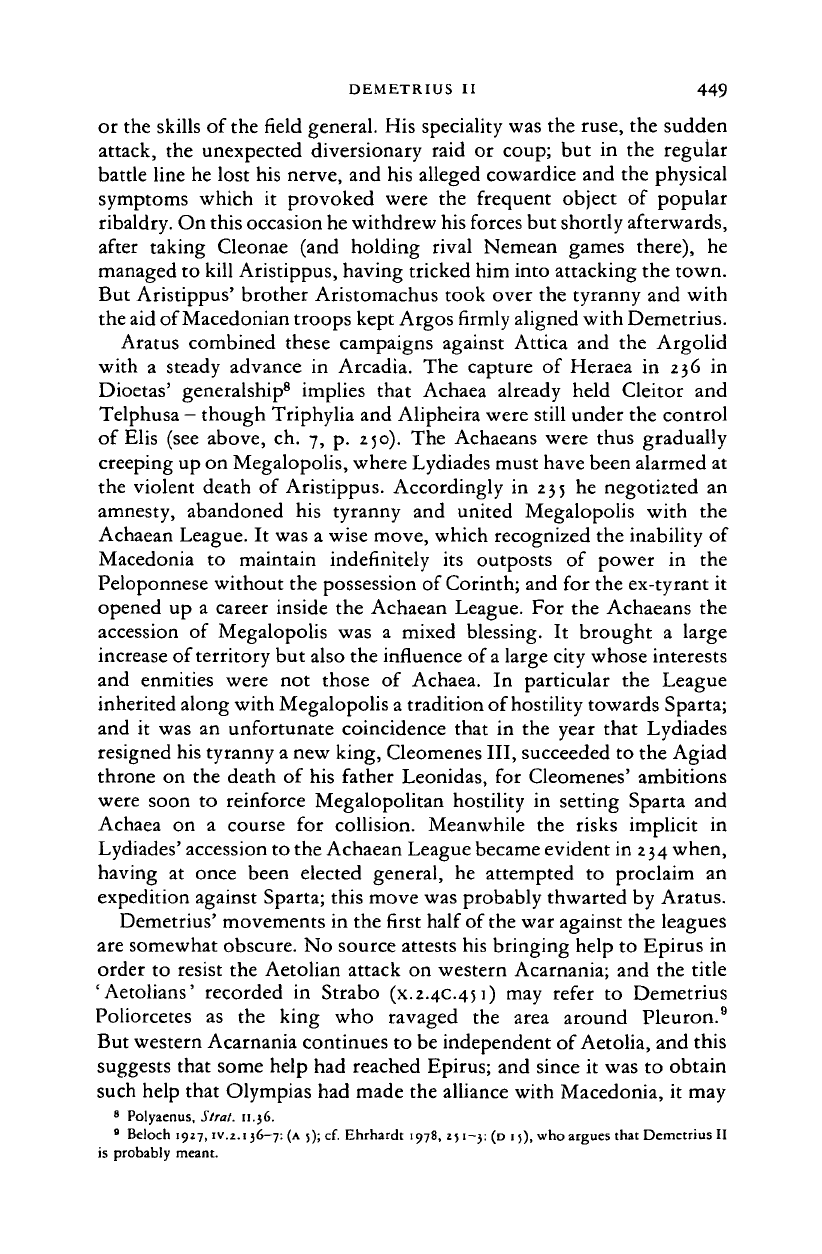
DEMETRIUS II 449
or the skills of the field general. His speciality was the ruse, the sudden
attack, the unexpected diversionary raid or coup; but in the regular
battle line he lost his nerve, and his alleged cowardice and the physical
symptoms which it provoked were the frequent object of popular
ribaldry. On this occasion he withdrew his forces but shortly afterwards,
after taking Cleonae (and holding rival Nemean games there), he
managed to kill Aristippus, having tricked him into attacking the town.
But Aristippus' brother Aristomachus took over the tyranny and with
the aid of Macedonian troops kept Argos firmly aligned with Demetrius.
Aratus combined these campaigns against Attica and the Argolid
with a steady advance in Arcadia. The capture of Heraea in 236 in
Dioetas' generalship
8
implies that Achaea already held Cleitor and
Telphusa - though Triphylia and Alipheira were still under the control
of Elis (see above, ch. 7, p. 250). The Achaeans were thus gradually
creeping up on Megalopolis, where Lydiades must have been alarmed at
the violent death of Aristippus. Accordingly in 235 he negotiated an
amnesty, abandoned his tyranny and united Megalopolis with the
Achaean League. It was a wise move, which recognized the inability of
Macedonia to maintain indefinitely its outposts of power in the
Peloponnese without the possession of Corinth; and for the ex-tyrant it
opened up a career inside the Achaean League. For the Achaeans the
accession of Megalopolis was a mixed blessing. It brought a large
increase of territory but also the influence of
a
large city whose interests
and enmities were not those of Achaea. In particular the League
inherited along with Megalopolis a tradition of hostility towards Sparta;
and it was an unfortunate coincidence that in the year that Lydiades
resigned his tyranny a new king, Cleomenes III, succeeded to the Agiad
throne on the death of his father Leonidas, for Cleomenes' ambitions
were soon to reinforce Megalopolitan hostility in setting Sparta and
Achaea on a course for collision. Meanwhile the risks implicit in
Lydiades' accession to the Achaean League became evident in 234 when,
having at once been elected general, he attempted to proclaim an
expedition against Sparta; this move was probably thwarted by Aratus.
Demetrius' movements in the first half of the war against the leagues
are somewhat obscure. No source attests his bringing help to Epirus in
order to resist the Aetolian attack on western Acarnania; and the title
'Aetolians' recorded in Strabo (X.2.4C.451) may refer to Demetrius
Poliorcetes as the king who ravaged the area around Pleuron.
9
But western Acarnania continues to be independent of Aetolia, and this
suggests that some help had reached Epirus; and since it was to obtain
such help that Olympias had made the alliance with Macedonia, it may
8
Polyaenus, Slral. 11.36.
9
Beloch 1927, iv.2.136-7:
(A
5); cf. Ehrhardt 1978,
251-3:
(D
IJ),
who argues that Demetrius II
is probably meant.
Cambridge Histories Online © Cambridge University Press, 2008
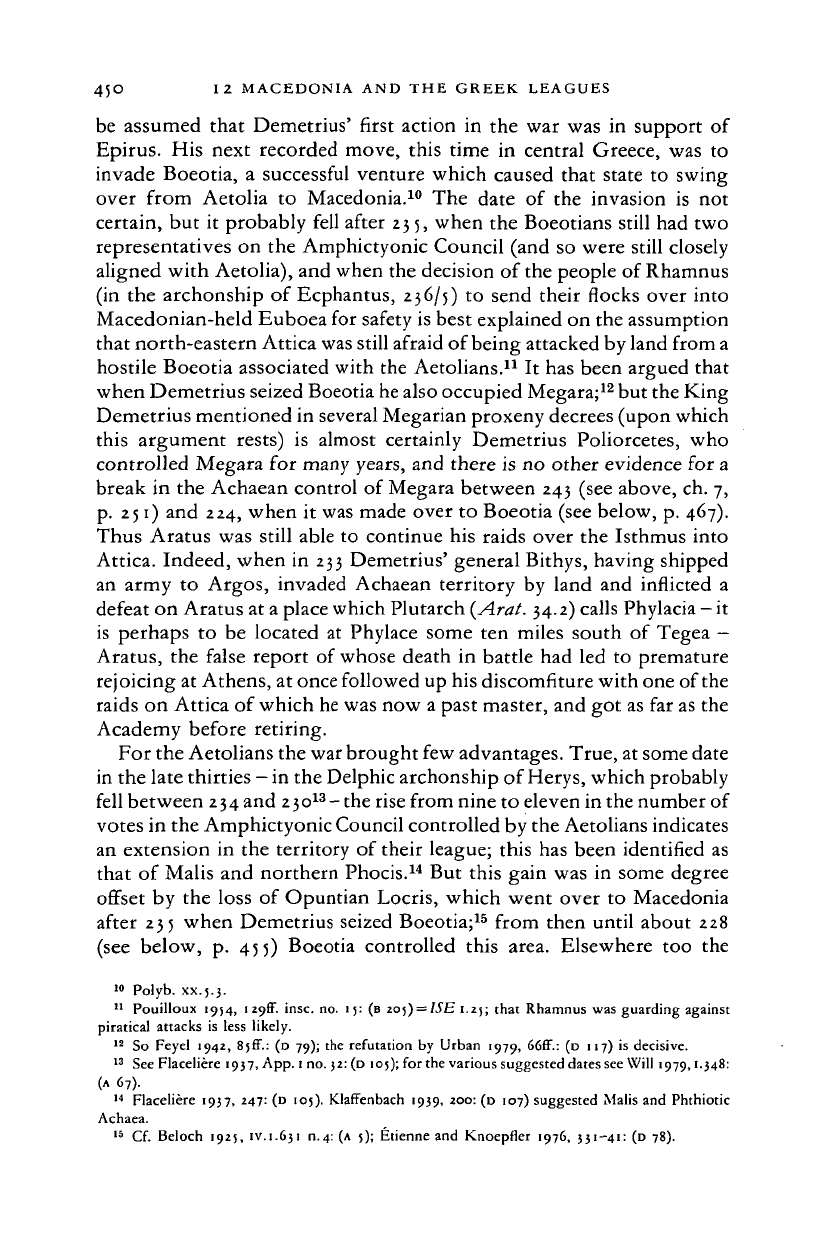
4JO 12 MACEDONIA AND THE GREEK LEAGUES
be assumed that Demetrius' first action
in the war
was
in
support
of
Epirus.
His
next recorded move, this time
in
central Greece,
was to
invade Boeotia,
a
successful venture which caused that state
to
swing
over from Aetolia
to
Macedonia.
10
The
date
of the
invasion
is not
certain,
but it
probably fell after 235, when
the
Boeotians still
had two
representatives
on
the
Amphictyonic Council
(and
so
were still closely
aligned with Aetolia),
and
when
the
decision
of
the people
of
Rhamnus
(in
the
archonship
of
Ecphantus, 236/5)
to
send their flocks over into
Macedonian-held Euboea
for
safety
is
best explained
on the
assumption
that north-eastern Attica was still afraid of being attacked by land from a
hostile Boeotia associated with
the
Aetolians.
11
It
has
been argued that
when Demetrius seized Boeotia he also occupied Megara;
12
but
the King
Demetrius mentioned
in
several Megarian proxeny decrees (upon which
this argument rests)
is
almost certainly Demetrius Poliorcetes,
who
controlled Megara
for
many years,
and
there
is no
other evidence
for a
break
in
the
Achaean control
of
Megara between 243
(see
above, ch.
7,
p.
251)
and
224, when
it
was made over
to
Boeotia
(see
below,
p. 467).
Thus Aratus
was
still able
to
continue
his
raids over
the
Isthmus into
Attica. Indeed, when
in
233 Demetrius' general Bithys, having shipped
an army
to
Argos, invaded Achaean territory
by
land
and
inflicted
a
defeat
on
Aratus
at a
place which Plutarch (Arat. 34.2) calls Phylacia-it
is perhaps
to be
located
at
Phylace some
ten
miles south
of
Tegea
-
Aratus,
the
false report
of
whose death
in
battle
had led to
premature
rejoicing
at
Athens,
at
once followed
up
his discomfiture with one of the
raids
on
Attica
of
which he was
now a
past master,
and got as
far
as
the
Academy before retiring.
For the Aetolians the war brought
few
advantages. True,
at
some date
in
the
late thirties
—
in the Delphic archonship
of
Herys,
which probably
fell between
234
and 2 3
o
13
-
the rise from nine
to
eleven
in
the number of
votes
in
the Amphictyonic Council controlled
by
the Aetolians indicates
an extension
in the
territory
of
their league; this
has
been identified
as
that
of
Malis
and
northern Phocis.
14
But
this gain
was
in
some degree
offset
by the
loss
of
Opuntian Locris, which went over
to
Macedonia
after
235
when Demetrius seized Boeotia;
15
from then until about
228
(see below,
p. 455)
Boeotia controlled this area. Elsewhere
too the
10
Polyb.
xx.5.3.
11
Pouilloux
1954,
iz<)S.
insc.
no. 15:
(B
IO^)
=
ISE
1.2;;
that Rhamnus
was
guarding against
piratical attacks
is
less likely.
12
So
Feyel
1942, 8}ff.:
(D
79);
the
refutation
by
Urban
1979, 66ff.:
(D
117)
is
decisive.
13
See
Flaceliere 1937, App.
1
no.
32:
(D
ioj);forthe various suggested dates see Will 1979,1.348:
(A
67).
14
Flaceliere
1937,
247:
(D
105).
Klaffenbach
1939,
200:
(D
107)
suggested Malis
and
Phthiotic
Achaea.
15
Cf.
Beloch
192),
iv.1.631
n.4:
(A
J); Etienne
and
Knoepfler
1976,
331-41:
(D
78).
Cambridge Histories Online © Cambridge University Press, 2008
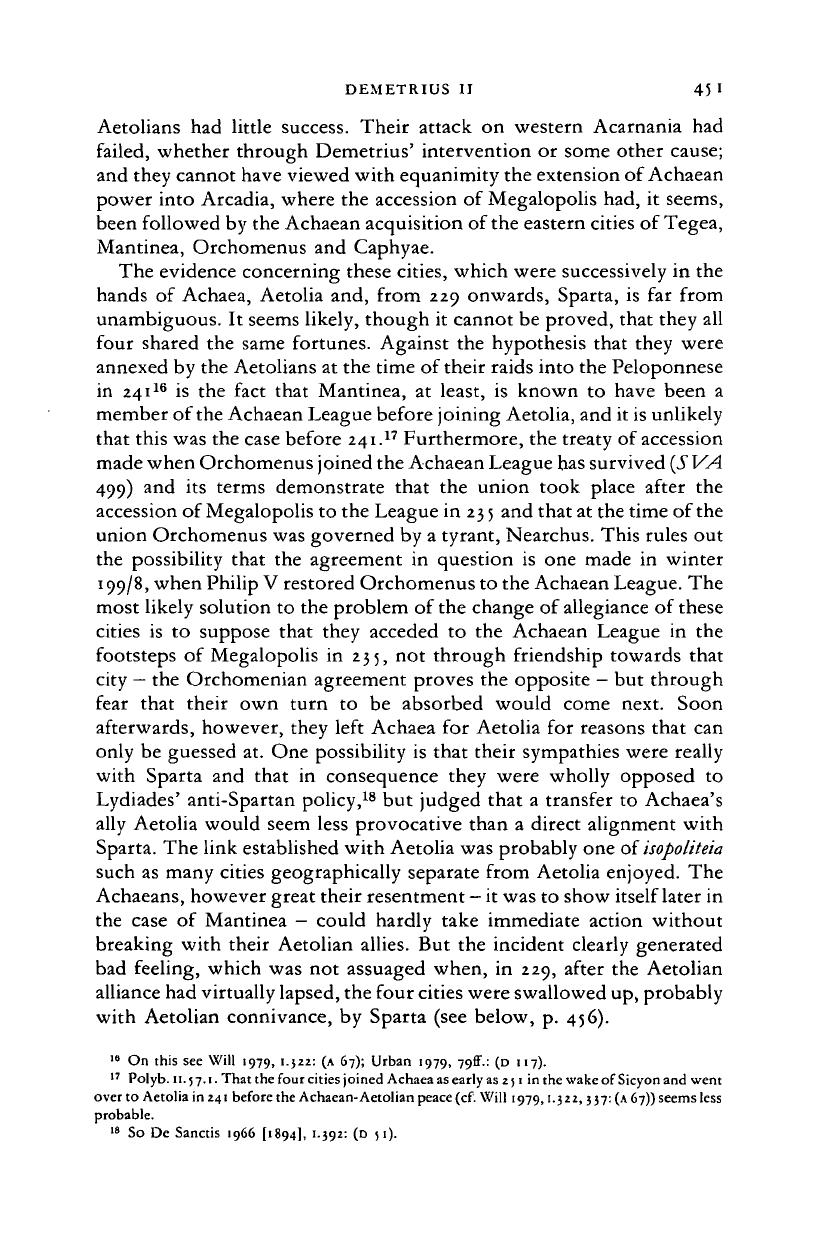
DEMETRIUS
II 45
l
Aetolians had little success. Their attack on western Acarnania had
failed, whether through Demetrius' intervention or some other cause;
and they cannot have viewed with equanimity the extension of Achaean
power into Arcadia, where the accession of Megalopolis had, it seems,
been followed by the Achaean acquisition of the eastern cities of Tegea,
Mantinea, Orchomenus and Caphyae.
The evidence concerning these cities, which were successively in the
hands of Achaea, Aetolia and, from 229 onwards, Sparta, is far from
unambiguous. It seems likely, though it cannot be proved, that they all
four shared the same fortunes. Against the hypothesis that they were
annexed by the Aetolians at the time of their raids into the Peloponnese
in 241
16
is the fact that Mantinea, at least, is known to have been a
member of
the
Achaean League before joining Aetolia, and it is unlikely
that this was the case before
241.
17
Furthermore, the treaty of accession
made when Orchomenus joined the Achaean League has survived {SVA.
499) and its terms demonstrate that the union took place after the
accession of Megalopolis to the League in
23 5
and that at the time of the
union Orchomenus was governed by a tyrant, Nearchus. This rules out
the possibility that the agreement in question is one made in winter
199/8,
when Philip V restored Orchomenus to the Achaean League. The
most likely solution to the problem of the change of allegiance of these
cities is to suppose that they acceded to the Achaean League in the
footsteps of Megalopolis in 235, not through friendship towards that
city
—
the Orchomenian agreement proves the opposite
—
but through
fear that their own turn to be absorbed would come next. Soon
afterwards, however, they left Achaea for Aetolia for reasons that can
only be guessed at. One possibility is that their sympathies were really
with Sparta and that in consequence they were wholly opposed to
Lydiades' anti-Spartan policy,
18
but judged that a transfer to Achaea's
ally Aetolia would seem less provocative than a direct alignment with
Sparta. The link established with Aetolia was probably one of
isopoliteia
such as many cities geographically separate from Aetolia enjoyed. The
Achaeans, however great their resentment - it was to show itself later in
the case of Mantinea
—
could hardly take immediate action without
breaking with their Aetolian allies. But the incident clearly generated
bad feeling, which was not assuaged when, in 229, after the Aetolian
alliance had virtually lapsed, the four cities were swallowed up, probably
with Aetolian connivance, by Sparta (see below, p. 456).
18
On this see Will 1979,
1.322:
(A 67); Urban 1979, 79?.: (D 117).
" Polyb.
11.5
7.1.
That the four cities joined Achaea
as
early
as 2 51
in the wake of Sicyon and went
over to Aetolia in
241
before the Achaean-Aetolian peace (cf. Will 1979,1.322,337:
(A
67)) seems less
probable.
18
So De Sanctis 1966 [1894],
1.392:
(D 51).
Cambridge Histories Online © Cambridge University Press, 2008
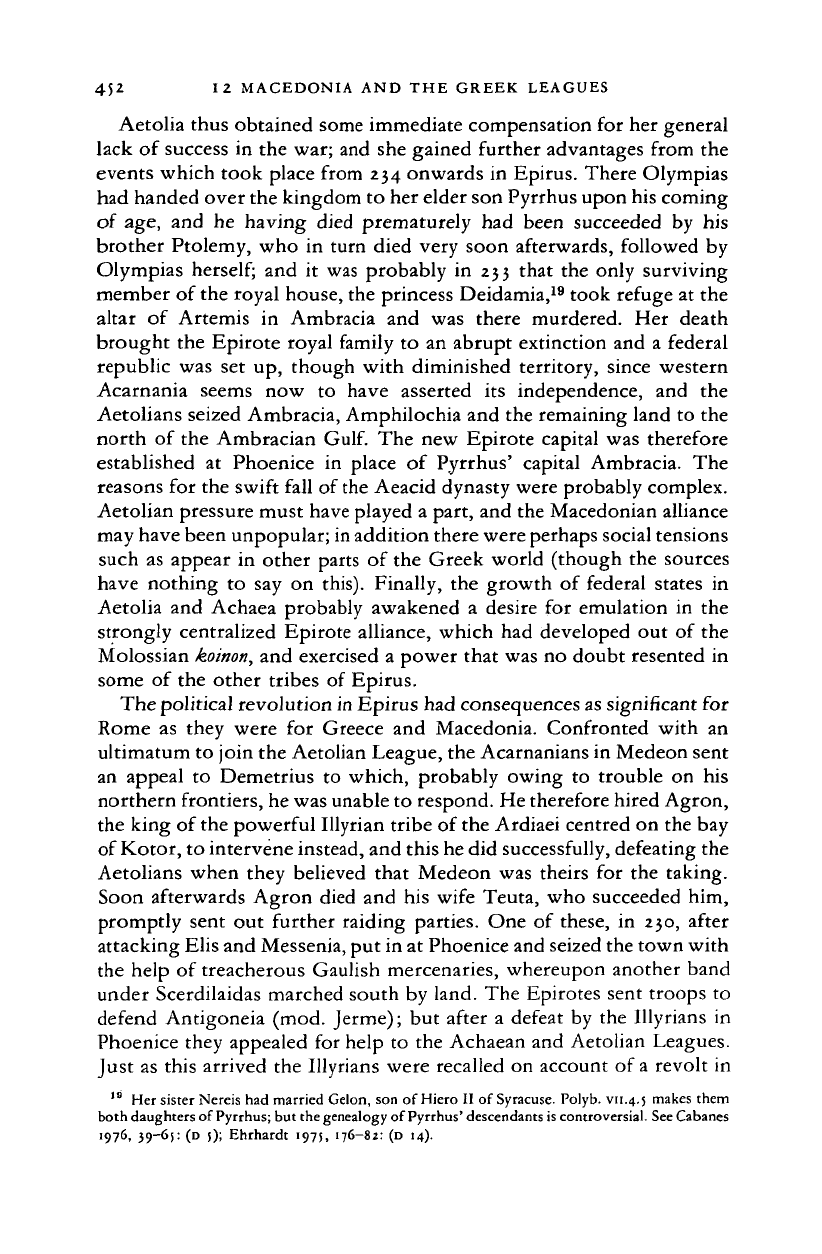
12 MACEDONIA AND THE GREEK LEAGUES
Aetolia thus obtained some immediate compensation
for
her general
lack
of
success
in the
war; and she gained further advantages from
the
events which took place from 234 onwards
in
Epirus. There Olympias
had handed over the kingdom to her elder son Pyrrhus upon his coming
of age,
and he
having died prematurely
had
been succeeded
by his
brother Ptolemy, who
in
turn died very soon afterwards, followed
by
Olympias
herself;
and it
was probably
in
233 that
the
only surviving
member
of
the royal house, the princess Deidamia,
19
took refuge
at
the
altar
of
Artemis
in
Ambracia
and was
there murdered.
Her
death
brought
the
Epirote royal family
to an
abrupt extinction and
a
federal
republic
was set up,
though with diminished territory, since western
Acarnania seems
now to
have asserted
its
independence,
and the
Aetolians seized Ambracia, Amphilochia and the remaining land
to
the
north
of
the Ambracian
Gulf.
The new
Epirote capital was therefore
established
at
Phoenice
in
place
of
Pyrrhus' capital Ambracia.
The
reasons
for
the swift fall
of
the Aeacid dynasty were probably complex.
Aetolian pressure must have played a part, and the Macedonian alliance
may have been unpopular;
in
addition there were perhaps social tensions
such
as
appear
in
other parts
of
the Greek world (though
the
sources
have nothing
to say on
this). Finally,
the
growth
of
federal states
in
Aetolia
and
Achaea probably awakened
a
desire
for
emulation
in the
strongly centralized Epirote alliance, which
had
developed
out of
the
Molossian
koinon,
and
exercised
a
power that was no doubt resented
in
some
of
the other tribes
of
Epirus.
The political revolution in Epirus had consequences as significant for
Rome
as
they were
for
Greece
and
Macedonia. Confronted with
an
ultimatum to join the Aetolian League, the Acarnanians in Medeon sent
an appeal
to
Demetrius
to
which, probably owing
to
trouble
on his
northern frontiers, he was unable to respond. He therefore hired Agron,
the king
of
the powerful Illyrian tribe
of
the Ardiaei centred on the bay
of Kotor, to intervene instead, and this he did successfully, defeating the
Aetolians when they believed that Medeon was theirs
for the
taking.
Soon afterwards Agron died
and his
wife Teuta, who succeeded
him,
promptly sent
out
further raiding parties. One
of
these,
in
230, after
attacking Elis and Messenia, put in at Phoenice and seized the town with
the help
of
treacherous Gaulish mercenaries, whereupon another band
under Scerdilaidas marched south
by
land. The Epirotes sent troops
to
defend Antigoneia (mod. Jerme);
but
after
a
defeat
by the
Illyrians
in
Phoenice they appealed
for
help
to
the Achaean and Aetolian Leagues.
Just
as
this arrived
the
Illyrians were recalled
on
account
of
a
revolt
in
li
Her sister Nereis had married Gelon, son
of
Hiero
II of
Syracuse. Polyb. vii.4.5 makes them
both daughters of
Pyrrhus;
but the genealogy of Pyrrhus' descendants is controversial. See Cabanes
1976,
39-65: (D
;);
Ehrhardt 1975, 176-82: (D
14).
Cambridge Histories Online © Cambridge University Press, 2008
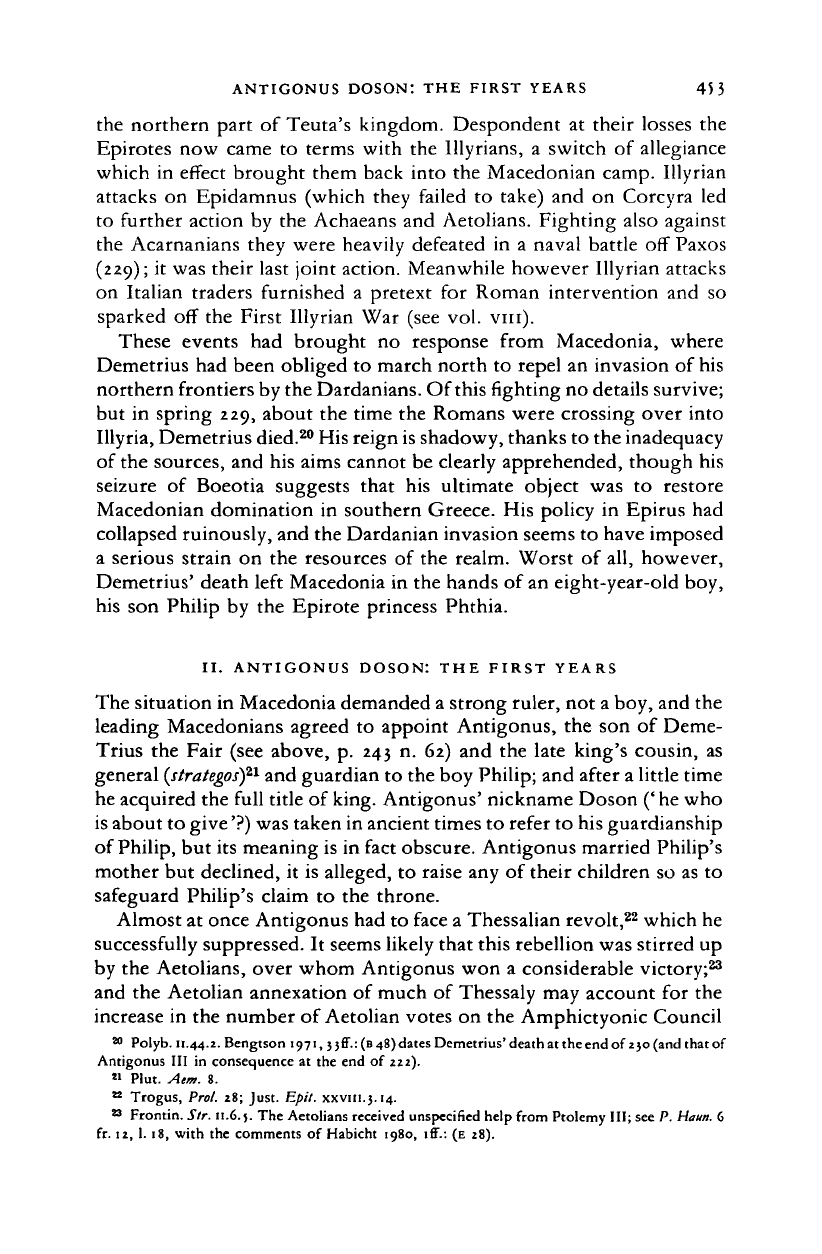
ANTIGONUS DOSON:
THE
FIRST YEARS
45}
the northern part of Teuta's kingdom. Despondent
at
their losses the
Epirotes now came
to
terms with the lllyrians,
a
switch
of
allegiance
which in effect brought them back into the Macedonian camp. Illyrian
attacks on Epidamnus (which they failed
to
take) and on Corcyra led
to further action by the Achaeans and Aetolians. Fighting also against
the Acarnanians they were heavily defeated
in a
naval battle off Paxos
(229);
it
was their last joint action. Meanwhile however Illyrian attacks
on Italian traders furnished
a
pretext
for
Roman intervention and
so
sparked off the First Illyrian War (see vol. vin).
These events
had
brought
no
response from Macedonia, where
Demetrius had been obliged to march north to repel an invasion of his
northern frontiers by the Dardanians. Of this fighting no details survive;
but in spring 229, about the time the Romans were crossing over into
Illyria, Demetrius died.
20
His reign is shadowy, thanks to the inadequacy
of the sources, and his aims cannot be clearly apprehended, though his
seizure
of
Boeotia suggests that
his
ultimate object was
to
restore
Macedonian domination in southern Greece. His policy in Epirus had
collapsed ruinously, and the Dardanian invasion seems to have imposed
a serious strain on the resources
of
the realm. Worst of all, however,
Demetrius' death left Macedonia in the hands of an eight-year-old boy,
his son Philip by the Epirote princess Phthia.
II.
ANTIGONUS DOSON: THE FIRST YEARS
The situation in Macedonia demanded a strong ruler, not a boy, and the
leading Macedonians agreed to appoint Antigonus, the son of Deme-
Trius the Fair (see above, p. 243
n.
62) and the late king's cousin,
as
general
{strategosf
1
and guardian to the boy Philip; and after a little time
he acquired the full title of king. Antigonus' nickname Doson (' he who
is about to give'?) was taken in ancient times to refer to his guardianship
of
Philip,
but its meaning is in fact obscure. Antigonus married Philip's
mother but declined,
it
is alleged, to raise any of their children so as
to
safeguard Philip's claim to the throne.
Almost at once Antigonus had to face a Thessalian revolt,
22
which he
successfully suppressed. It seems likely that this rebellion was stirred up
by the Aetolians, over whom Antigonus won a considerable victory;
23
and the Aetolian annexation of much of Thessaly may account for the
increase in the number of Aetolian votes on the Amphictyonic Council
80
Polyb. 11.44.2. Bengtson 1971,3
$K.:
(B
48) dates Demetrius' death at the end of
2 50
(and that of
Antigonus
III in
consequence
at
the end
of
222).
11
Plut.
Aem.
8.
42
Trogus, Pro/. 28; Just.
Epil.
xxvm.3.14.
0
Frontin. Sir. 11.6.5. The Aetolians received unspecified help from Ptolemy III; see P. Haun.
6
fr.
12, 1. 18, with the comments
of
Habicht 1980,
iff.:
(E 28).
Cambridge Histories Online © Cambridge University Press, 2008
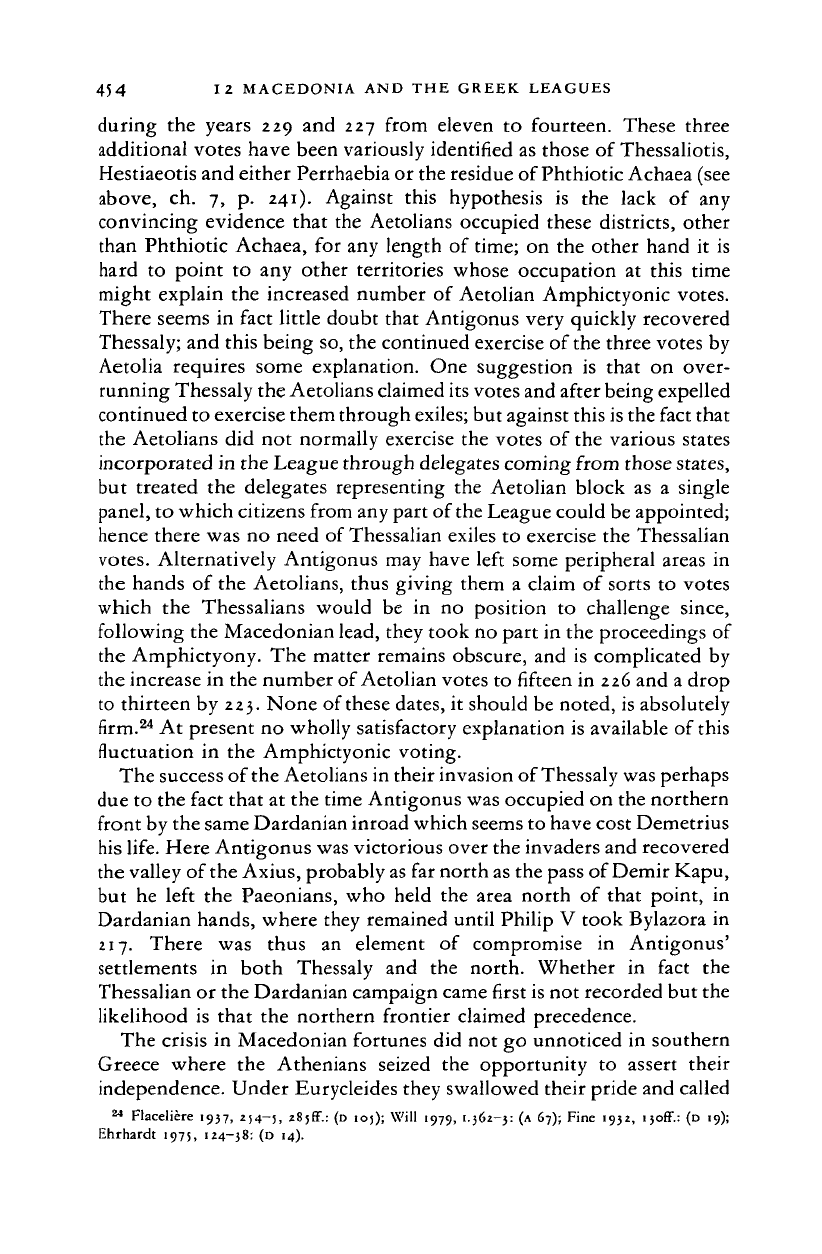
454 12 MACEDONIA AND THE GREEK LEAGUES
during
the
years
229 and 227
from eleven
to
fourteen. These three
additional votes have been variously identified
as
those
of
Thessaliotis,
Hestiaeotis and either Perrhaebia or the residue of Phthiotic Achaea (see
above,
ch. 7, p. 241).
Against this hypothesis
is the
lack
of any
convincing evidence that
the
Aetolians occupied these districts, other
than Phthiotic Achaea,
for
any length
of
time;
on the
other hand
it is
hard
to
point
to any
other territories whose occupation
at
this time
might explain
the
increased number
of
Aetolian Amphictyonic votes.
There seems
in
fact little doubt that Antigonus very quickly recovered
Thessaly; and this being so, the continued exercise
of
the
three votes
by
Aetolia requires some explanation.
One
suggestion
is
that
on
over-
running Thessaly the Aetolians claimed its votes and after being expelled
continued to exercise them through
exiles;
but against this is the fact that
the Aetolians
did not
normally exercise
the
votes
of
the various states
incorporated in the League through delegates coming from those states,
but treated
the
delegates representing
the
Aetolian block
as a
single
panel, to which citizens from any part of
the
League could be appointed;
hence there was
no
need
of
Thessalian exiles
to
exercise
the
Thessalian
votes.
Alternatively Antigonus
may
have left some peripheral areas
in
the hands
of
the Aetolians, thus giving them
a
claim
of
sorts
to
votes
which
the
Thessalians would
be in no
position
to
challenge since,
following the Macedonian lead, they took no part
in
the proceedings
of
the Amphictyony.
The
matter remains obscure,
and is
complicated
by
the increase
in
the number of Aetolian votes
to
fifteen
in
226 and a drop
to thirteen
by
223. None of these dates,
it
should be noted, is absolutely
firm.
24
At present
no
wholly satisfactory explanation
is
available
of
this
fluctuation in
the
Amphictyonic voting.
The success of the Aetolians in their invasion of Thessaly was perhaps
due
to
the fact that
at
the time Antigonus was occupied
on
the northern
front by the same Dardanian inroad which seems to have cost Demetrius
his life. Here Antigonus was victorious over the invaders and recovered
the valley of the Axius, probably as far north as the pass of Demir Kapu,
but
he
left
the
Paeonians,
who
held
the
area north
of
that point,
in
Dardanian hands, where they remained until Philip
V
took Bylazora
in
217.
There
was
thus
an
element
of
compromise
in
Antigonus'
settlements
in
both Thessaly
and the
north. Whether
in
fact
the
Thessalian
or
the Dardanian campaign came first is not recorded but the
likelihood
is
that
the
northern frontier claimed precedence.
The crisis
in
Macedonian fortunes
did
not
go
unnoticed
in
southern
Greece where
the
Athenians seized
the
opportunity
to
assert their
independence. Under Eurycleides they swallowed their pride and called
24
Flaceliere 1937, 254-5, 285fF.:
(D
IOJ);
Will 1979, 1.362-3: (A 67); Fine 1932,
i3off.:
(D
19);
Ehrhardt
1975,
124-38: (D
14).
Cambridge Histories Online © Cambridge University Press, 2008
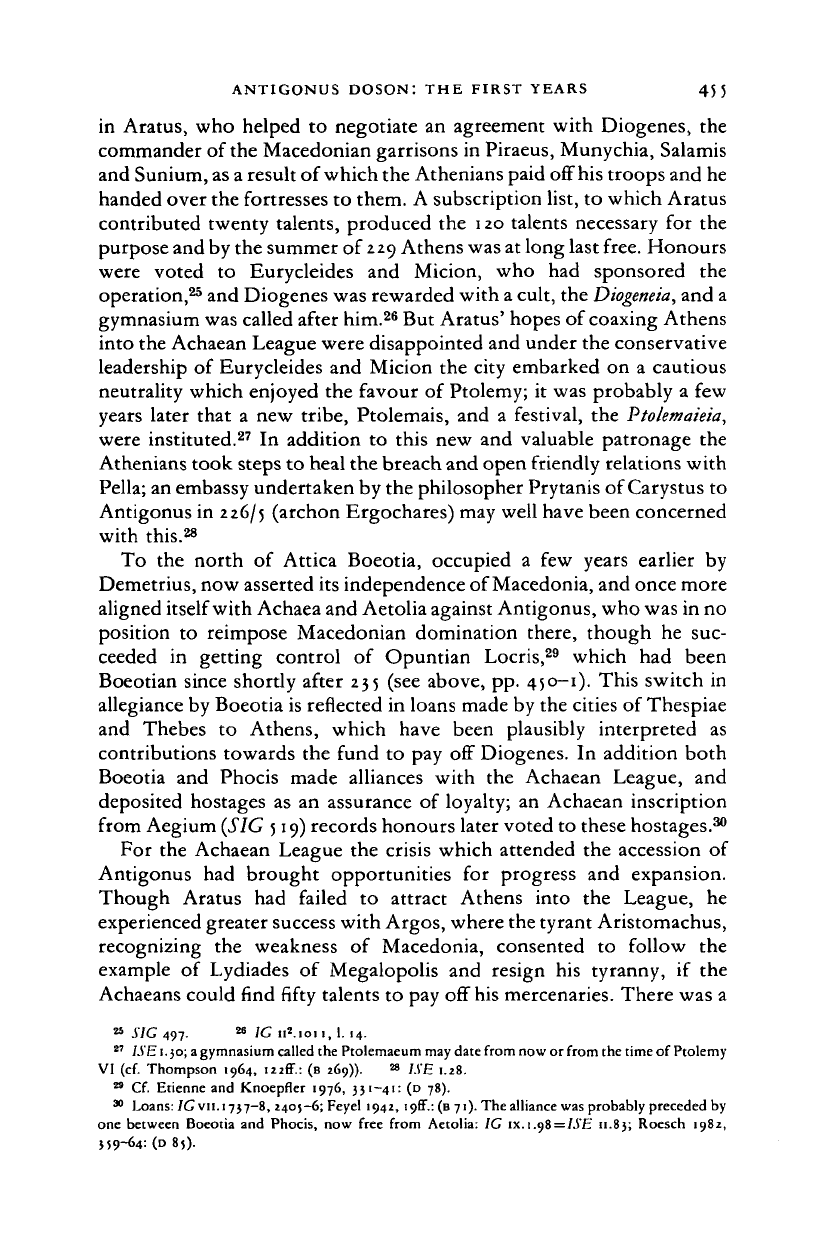
ANTIGONUS DOSON: THE FIRST YEARS 455
in Aratus,
who
helped
to
negotiate
an
agreement with Diogenes,
the
commander
of
the Macedonian garrisons
in
Piraeus, Munychia, Salamis
and Sunium, as a result of which the Athenians paid ofiFhis troops and
he
handed over the fortresses
to
them. A subscription list,
to
which Aratus
contributed twenty talents, produced
the
120 talents necessary
for the
purpose and by the summer
of
229
Athens was at long last free. Honours
were voted
to
Eurycleides
and
Micion,
who
had
sponsored
the
operation,
25
and Diogenes was rewarded with a cult, the
Diogeneia,
and a
gymnasium was called after him.
26
But Aratus' hopes
of
coaxing Athens
into the Achaean League were disappointed and under the conservative
leadership
of
Eurycleides
and
Micion
the
city embarked
on a
cautious
neutrality which enjoyed
the
favour
of
Ptolemy;
it
was probably
a few
years later that
a
new
tribe, Ptolemais,
and
a
festival,
the
Ptolemaieia,
were instituted.
27
In
addition
to
this
new and
valuable patronage
the
Athenians took steps to heal the breach and open friendly relations with
Pella; an embassy undertaken by the philosopher Prytanis of Carystus
to
Antigonus in 226/5 (archon Ergochares) may well have been concerned
with this.
28
To
the
north
of
Attica Boeotia, occupied
a
few
years earlier
by
Demetrius, now asserted its independence of Macedonia, and once more
aligned itself with Achaea and Aetolia against Antigonus, who was in
no
position
to
reimpose Macedonian domination there, though
he
suc-
ceeded
in
getting control
of
Opuntian Locris,
29
which
had
been
Boeotian since shortly after 235 (see above, pp. 450-1). This switch
in
allegiance by Boeotia is reflected
in
loans made by the cities
of
Thespiae
and Thebes
to
Athens, which have been plausibly interpreted
as
contributions towards
the
fund
to pay off
Diogenes.
In
addition both
Boeotia
and
Phocis made alliances with
the
Achaean League,
and
deposited hostages
as an
assurance
of
loyalty;
an
Achaean inscription
from Aegium (SIG 519) records honours later voted to these hostages.
30
For
the
Achaean League
the
crisis which attended
the
accession
of
Antigonus
had
brought opportunities
for
progress
and
expansion.
Though Aratus
had
failed
to
attract Athens into
the
League,
he
experienced greater success with Argos, where the tyrant Aristomachus,
recognizing
the
weakness
of
Macedonia, consented
to
follow
the
example
of
Lydiades
of
Megalopolis
and
resign
his
tyranny,
if
the
Achaeans could find fifty talents
to
pay
off
his
mercenaries. There was
a
25
SIG
497.
M
1G n
2
.ion,
I. 14.
27
ISE 1.30;
a
gymnasium called the Ptolemaeum may date from now or from the time
of
Ptolemy
VI
(cf.
Thompson 1964,
122(1".:
(B 269)).
» ISE 1.28.
29
Cf.
Etienne and Knoepfler 1976,
331-41:
(D
78).
30
Loans:/C vn. 1737-8, 2405-6; Feyel 1942, i9ff.:(B 71). The alliance was probably preceded by
one between Boeotia
and
Phocis,
now
free from Aetolia:
IG
ix.i.<)$
= ISE
11.83;
Roesch
1982,
559-64: (D 85).
Cambridge Histories Online © Cambridge University Press, 2008
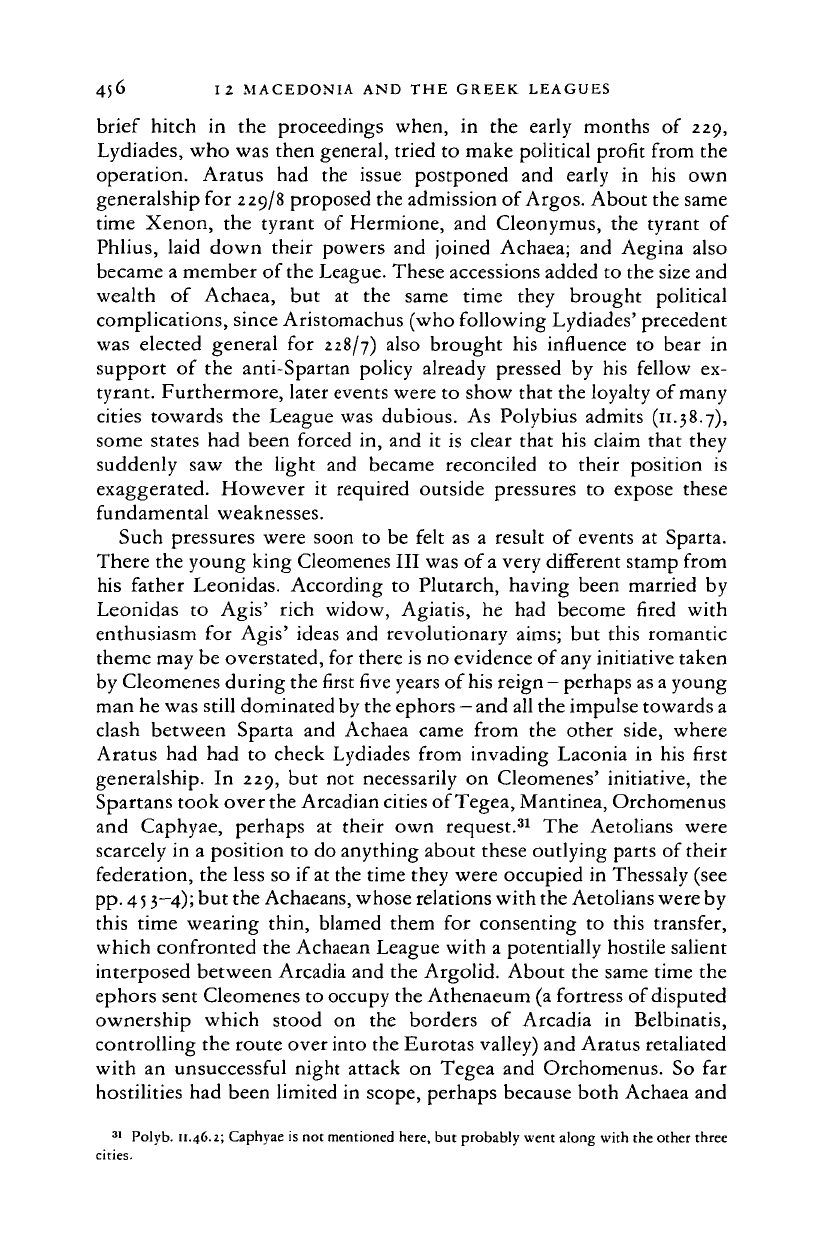
456 12 MACEDONIA AND THE GREEK LEAGUES
brief hitch
in the
proceedings when,
in the
early months
of 229,
Lydiades, who was then general, tried
to
make political profit from
the
operation. Aratus
had the
issue postponed
and
early
in his own
generalship
for
229/8 proposed the admission of
Argos.
About the same
time Xenon,
the
tyrant
of
Hermione,
and
Cleonymus,
the
tyrant
of
Phlius, laid down their powers
and
joined Achaea;
and
Aegina also
became a member of
the
League. These accessions added to the size and
wealth
of
Achaea,
but at the
same time they brought political
complications, since Aristomachus (who following Lydiades' precedent
was elected general
for
228/7)
a
'
so
brought
his
influence
to
bear
in
support
of the
anti-Spartan policy already pressed
by his
fellow
ex-
tyrant. Furthermore, later events were to show that the loyalty of many
cities towards
the
League was dubious.
As
Polybius admits (11.38.7),
some states
had
been forced
in, and it is
clear that
his
claim that they
suddenly
saw the
light
and
became reconciled
to
their position
is
exaggerated. However
it
required outside pressures
to
expose these
fundamental weaknesses.
Such pressures were soon
to be
felt
as a
result
of
events
at
Sparta.
There the young king Cleomenes III was
of
a
very different stamp from
his father Leonidas. According
to
Plutarch, having been married
by
Leonidas
to
Agis' rich widow, Agiatis,
he had
become fired with
enthusiasm
for
Agis' ideas
and
revolutionary aims;
but
this romantic
theme may be overstated, for there is no evidence of any initiative taken
by Cleomenes during the
first
five
years of
his
reign
-
perhaps as a young
man he was still dominated by the ephors
-
and all the impulse towards a
clash between Sparta
and
Achaea came from
the
other side, where
Aratus
had had to
check Lydiades from invading Laconia
in his
first
generalship.
In
229,
but not
necessarily
on
Cleomenes' initiative,
the
Spartans took over the Arcadian cities of Tegea, Mantinea, Orchomenus
and Caphyae, perhaps
at
their
own
request.
31
The
Aetolians were
scarcely
in a
position
to
do anything about these outlying parts
of
their
federation, the less so
if
at the time they were occupied
in
Thessaly (see
pp.
45
3—4);
but the Achaeans, whose relations with the Aetolians were by
this time wearing thin, blamed them
for
consenting
to
this transfer,
which confronted the Achaean League with
a
potentially hostile salient
interposed between Arcadia and the Argolid. About the same time
the
ephors sent Cleomenes to occupy the Athenaeum (a fortress of disputed
ownership which stood
on the
borders
of
Arcadia
in
Belbinatis,
controlling the route over into the Eurotas valley) and Aratus retaliated
with
an
unsuccessful night attack
on
Tegea
and
Orchomenus.
So far
hostilities
had
been limited
in
scope, perhaps because both Achaea and
31
Polyb. 11.46.2; Caphyae is not mentioned here,
but
probably went along with the other three
cities.
Cambridge Histories Online © Cambridge University Press, 2008
